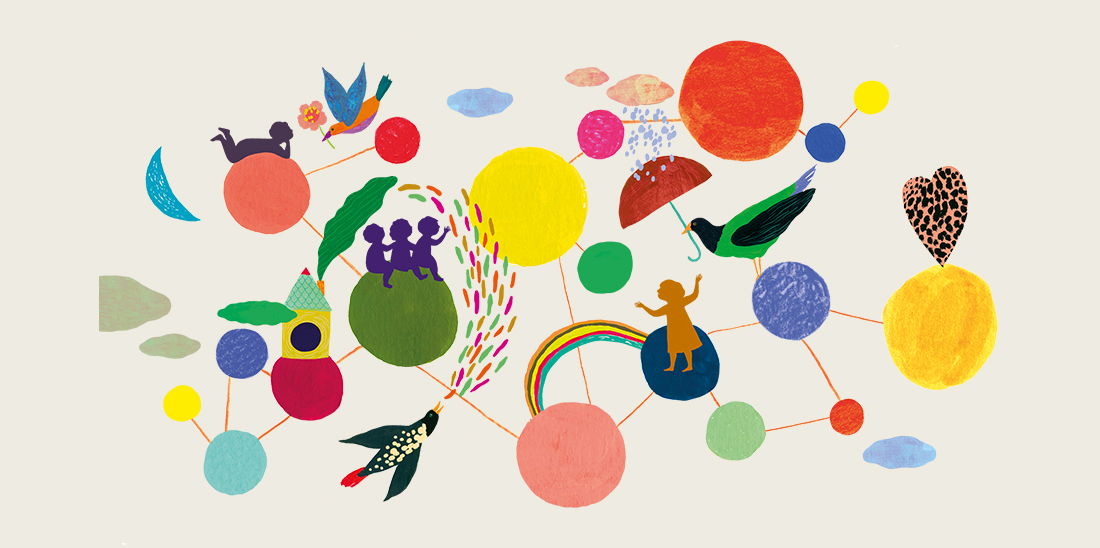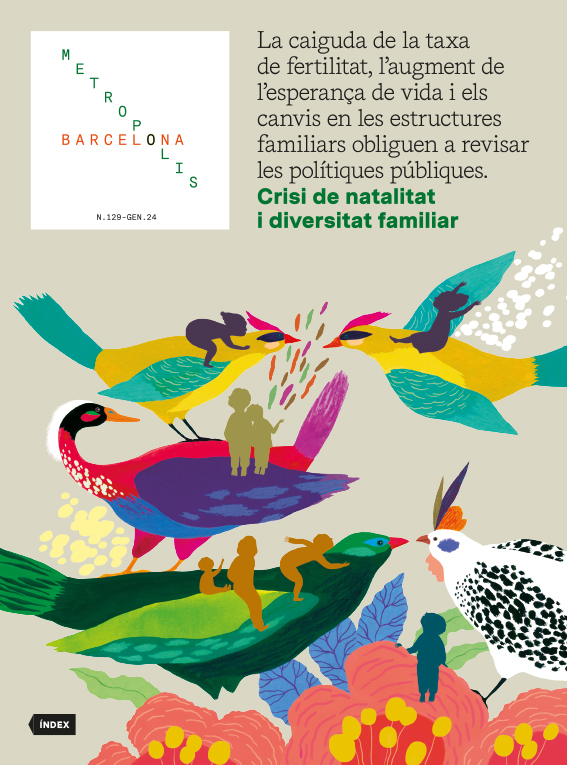Parenting communities: a growing alternative
Birth rate crisis and family diversity
- Dossier
- Jan 24
- 9 mins

The vanishing extended family, the complexities of parenting, and the rise of new educational codes are driving the expansion of alternative networks operating on various fronts. While initially limited to affluent social classes, there are now public and community-led initiatives democratising access, becoming arenas for the exchange of knowledge, resources and caregiving responsibilities.
Parenting, as a social practice, has undergone profound changes in terms of its forms and meanings over the last few decades. Sociodemographic trends have led to considerably smaller families, with the arrival of children either delayed or avoided altogether. This shift has made parenting an increasingly exceptional occurrence. Therefore, we are now witnessing a social revaluation of childhood and parenting, but also a notable absence of reference points in the immediate environment.
When it comes to extended families, they seem to have become relics of the past. Nowadays, the primary responsibility for raising children falls heavily on the nuclear family in its various forms, with women taking on a predominant role. Although grandparents, particularly grandmothers, still play a crucial and supportive role in parenting – sometimes too intensely, considering their age when taking on this responsibility – the dynamics have undeniably shifted. Unlike the past, where responsibilities were shared within a framework of cohabitation, today’s scenario involves more of a handover that parents do as they strive to maintain a strong commitment to their work.
This shift towards reliance on a handful of individuals to assist with childrearing is happening within a broader context of societal atomisation, where most needs are dealt with individually and privately, carrying the risks of exclusion for those unable to cope with them. In fact, the challenges of raising children in this context – difficulties that childhood and family policies have not fully acknowledged as needing a turnaround – are a factor that exacerbates the decline and delay in birth rates.
The emergence of community bonds
Amidst this somewhat bleak landscape, there has been a noticeable surge in initiatives over recent years that cultivate community bonds revolving around parenting. To truly understand this phenomenon, it’s crucial to steer clear of any romanticised notion of community, which envisions it as a closed group engaged in organic solidarity. While providing security to its members, it simultaneously imposes restrictions on their freedom. This perspective is often linked to pre-industrial, rural societies, or those associated with different hemispheres.
Today, the idea of community is best understood as a fabric of social connections, weaving networks of varying density among individuals that come together to provide support and share resources in various aspects of life. Communities are not static entities; instead, they are dynamic processes where individuals actively and intentionally participate, interacting and cultivating a sense of belonging along with a commitment to reciprocity.
Shared parenting groups serve as an example, established by self-organised families to provide support to their children by pooling economic and human resources – a concept sometimes referred to as “alternative pre-schools” or “alternative education programmes”. Other initiatives are steered by municipal childhood policies, including family spaces and collective initiatives supporting positive parenting. These efforts also originate from public health services, as seen in initiatives like postpartum support groups or breastfeeding support groups. Furthermore, entirely informal groups, consisting of a mix of friends, family or neighbours, have the potential to evolve into small communities offering support in childrearing.
The absence or inadequacy of family support is a significant factor prompting the pursuit of alternative connections, but so is the emergence of new parenting approaches.
All these approaches unite individuals and families around a shared need: the desire to share childrearing and receive support, both in material and emotional terms. The absence or inadequacy of family support is a significant factor prompting the pursuit of these connections. Yet, another critical aspect comes into play: the emergence of innovative parenting approaches that widens the gaps with previous generations. In the realm of pedagogy, these approaches converge under the term “respectful parenting”, a collection of perspectives advocating for emotional guidance for children. This entails addressing their emotional and relational needs with an awareness that was previously lacking. In recent years, paediatrics has also embraced a more attentive approach to the specific processes and rhythms of childhood in various areas, such as nutrition, sleep and motor development.
The experience of loneliness in parenting is not solely a consequence of the physical absence or distance of the extended family but also reaches a symbolic level, marked by unshared codes. Consequently, even with substantial family support crucial for daily tasks, it falls short of serving as the sought-after reference point in other contexts.
Reciprocity and cooperation in various forms
Communities centred around parenting emerge from a spectrum of needs that go beyond the material dimension. Nevertheless, this material aspect remains central, emphasising the integral role of sharing and exchanging resources within these spaces. Reciprocity and cooperation manifest in various forms, and a few examples are outlined below.
Firstly, there’s the non-monetary exchange of clothing, toys and childcare items, carrying notable economic implications. Secondly, there’s the collaborative sharing of caregiving responsibilities or the delegation of specific moments to other group members. Thirdly, the group collectively assumes economic costs, ranging from simple snacks to the rental of a space. Lastly, there’s the pooling of abundant and valuable cognitive capital, encompassing practical information on various topics (such as applying for a scholarship for summer camps), knowledge drawn from personal experiences (like insights into stages of development or nutrition), and individual strategies beneficial to others (for instance, child weaning techniques). This diverse sharing of resources not only forges but also strengthens the connections between individuals. Certain aspects of this shared experience significantly contribute to the formation of group identity and peer recognition – factors that family connections might find challenging to provide.
These spaces do not uniformly exist across society, or at least not in all their forms. The adoption of new parenting paradigms has been swifter among the middle and upper classes, as well as native families or those from culturally similar contexts (such as expats) with higher educational qualifications. This demographic profile is prevalent in many shared parenting initiatives of the “pre-school” type. However, working-class communities create more informal support networks that fulfil very similar functions.
Public-led initiatives
The increasing community initiatives led by public authorities to promote these spaces, often incorporating innovative perspectives, are contributing to democratising and dismantling the segregation often associated with respectful parenting projects. Noteworthy examples in the city of Barcelona include family spaces, explicitly designed to facilitate children’s free movement and open play. Additionally, there are workshops and lectures organised by libraries, community centres, crèches, and the Vila Veïna [“community house”] service, addressing diverse topics like screen usage, baby-led weaning (BLW) and boundary management.
Moreover, these spaces see a predominant presence of women, with mothers playing a more central role. This dynamic has a dual interpretation and poses a challenging yet surmountable balance. On the one hand, it reflects a patriarchal society that assigns the primary responsibility for caregiving to women, especially mothers. Considering this, it’s a matter of justice for fathers to actively participate in their rightful share of the responsibility, both within households and in community spaces, fostering a truly mixed environment. This reflects a shift towards a more egalitarian society, which, while not fully achieved, is making significant strides, especially in the realm of parenting.
Patriarchy has constructed an idealised image of the “good mother”, wholly dedicated to parenting. This serves as a societal expectation that often instils considerable unease in mothers who feel they never quite measure up to the standard of “doing it well enough”.
On the other hand, it’s crucial to acknowledge that patriarchy has constructed an idealised image of the “good mother”, wholly dedicated to parenting. This serves as a societal expectation that often instils considerable unease in mothers who feel they never quite measure up to the standard of “doing it well enough”. In response to this, spaces among mothers become particularly meaningful, offering a platform for deconstructing the patriarchal societal norm through interactions with peers. Strength blossoms from unity.
It’s also imperative not to overlook the biological dimension of having gestated, given birth and, in many cases, breastfed – matters that are frequently addressed in community parenting spaces precisely due to their feminisation. In this context, the gathering of mothers can be highly empowering, but it should not imply perpetuating the feminisation of caregiving responsibilities. Less common but noteworthy is the emergence of groups of fathers seeking this peer space to challenge the patriarchal social mandate that deprives them of active involvement and full co-responsibility as fathers. Their goal is to collectively construct an alternative.
The dynamic nature of community spaces, the societal revaluation of parenting, and a growing acceptance of feminist values constitute three factors driving advancements toward a more collectively responsible approach to childcare. This envisions childcare not just as a private or family matter but as a shared concern. Community connections arise not only as a necessary alternative amid the crisis of the extended family and our limited welfare state but also as a value in their own right. They hold the potential to imbue life with collective meaning and contribute to dismantling an individualism that consigns us to discontent.
References
Bauman, Z. Comunidad. En busca de seguridad en un mundo hostil. Siglo XXI, Madrid, 2006.
Del Olmo, C. ¿Dónde está mi tribu? Maternidad y crianza en una sociedad individualista. Clave Intelectual, Madrid, 2013.
Ezquerra, S., Di Masso Tarditti, M. and Rivera Ferre, M. G. Comunes reproductivos. Cercamientos y descercamientos contemporáneos en los cuidados y la agroecología. Catarata, Madrid, 2022.
González Reyes, M., García Pedraza, N., Fonte Loureiro, P. and Iglesias Varela, B. Cuidar, criar, hacer comunidad. Una experiencia de crianza compartida. Libros en Acción, Madrid, 2021.
The newsletter
Subscribe to our newsletter to keep up to date with Barcelona Metròpolis' new developments




